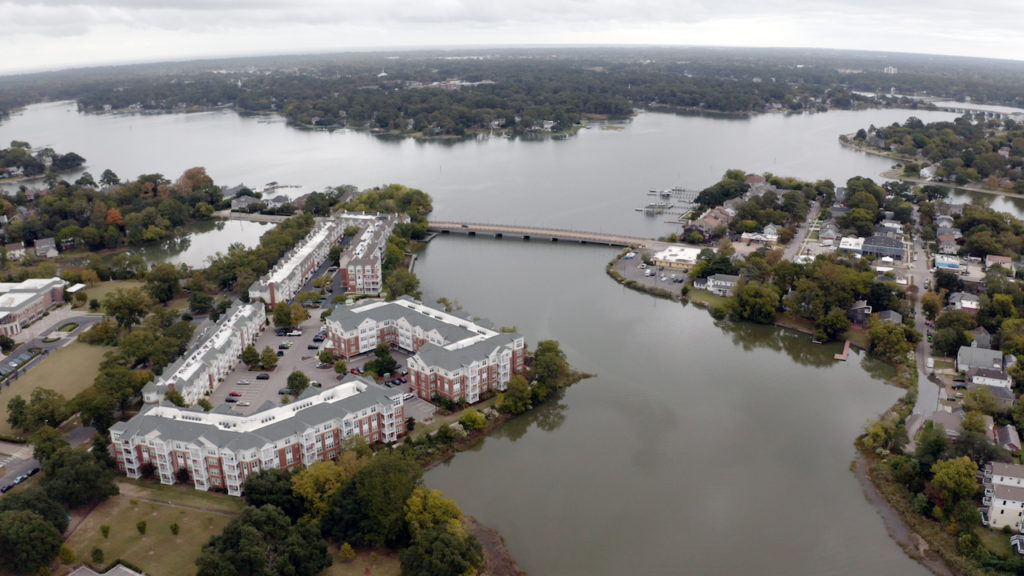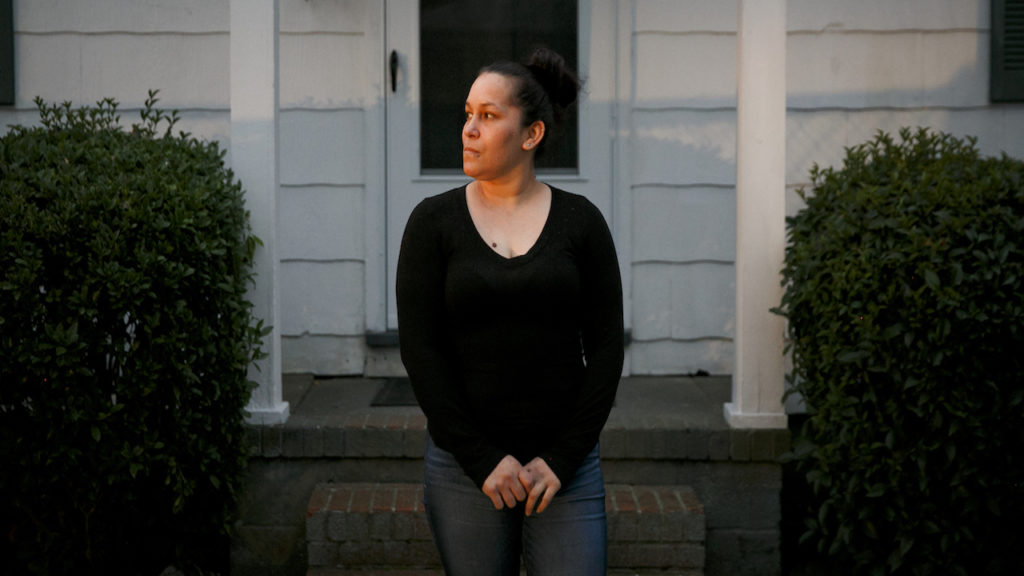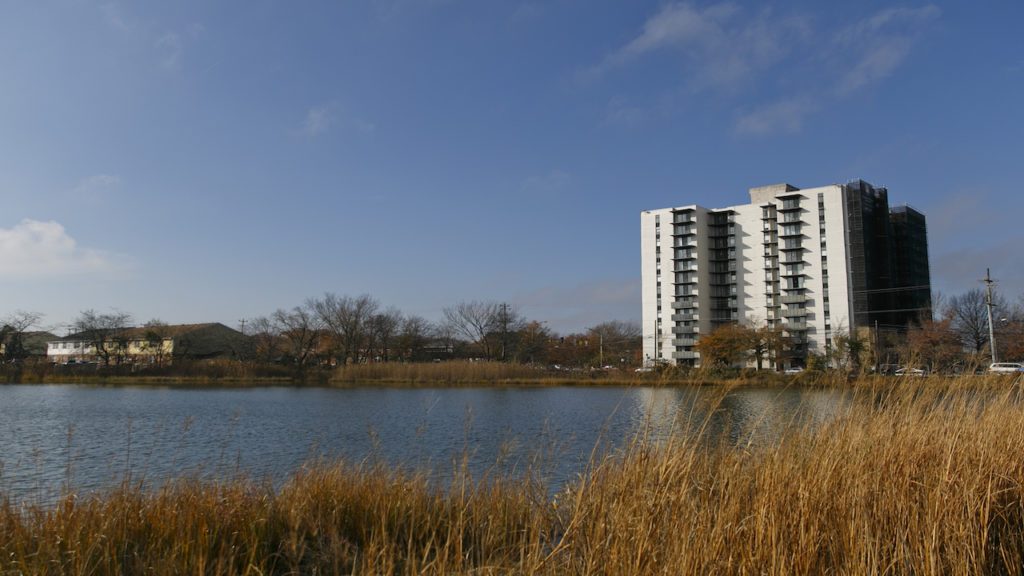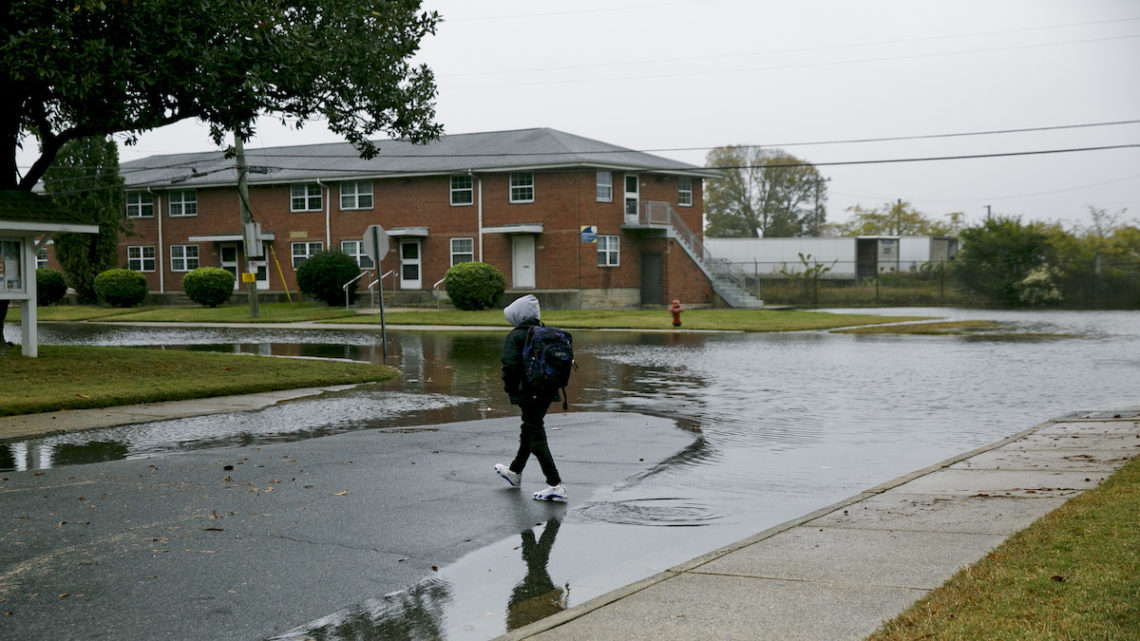Photo by Kristen Zeis. The Tidewater Gardens public housing complex in Norfolk has flooded for years. Now, the city is tearing it down and building several ponds to help with stormwater drainage.
This story is part of “At A Crossroads,” a WHRO Public Media series exploring how coastal Virginia is dealing with higher waters due to climate change. The project is funded by the Pulitzer Center on Crisis Reporting as part of its nationwide Connected Coastlines reporting initiative.
By Sam Turken
For the past three months, Tisha Melton has searched nonstop for a new rental home. She’s tried 80 different places, but landlords keep taking other people.
Melton currently lives in the Tidewater Gardens public housing complex in Norfolk. But as the city redevelops the flood-prone neighborhood to make it more resilient to sea level rise, Melton is among hundreds of residents who have to move out and find somewhere else to live.
“This process has been hell,” Melton said. “The competition is crazy. You have to be perfect to get a place right now.”
About 1,500 low-income rental units across Virginia could face major flooding by 2050. That raises the question — where will people move if some apartments start going underwater and become unlivable?
Virginia already has a shortage of affordable apartments. Housing activists say sea level rise could dramatically exacerbate that, putting many people in the same position as the families in Tidewater Gardens — a desperate struggle to find somewhere else to live.

‘You need a boat’
Tidewater Gardens has had a flooding problem for years. Rainstorms turn streets into lakes, drenching residents’ feet and legs as they walk in and out of their apartments. Even King Tides on sunny days can inundate parts of the area.
The water “will just start getting higher and higher,” Melton said. “And it looks like the cars are sinking.”
Melton said she usually tries to stay dry by parking her car as close as possible to her apartment porch. She’ll then hop in through the passenger side and crawl into the driver’s seat.
“You need a boat. It’s that bad,” she said.
The neighborhood used to be a creek connected to the Elizabeth River. Then, more than a century ago, Norfolk started filling it in and ultimately built a sprawling public housing community.
Lots of underground pipes and culverts were supposed to help keep water out of the low-lying area. But city officials say that’s no longer possible because sea level rise and more intense rainfall are overwhelming the system.
“So we want to kind of let the floodplain act more naturally, kind of go where the water wants to go and used to go,” said Kyle Spencer, Norfolk’s deputy resilience officer.
The city plans to restore part of the creek and build several ponds with wetlands to help store floodwater — part of a new huge park that could include bike trails, playgrounds and a field.
But that means excavators are demolishing Tidewater Gardens — more than 600 units. Norfolk will build a mixed-income residential community, and city officials say public housing residents will be able to come back once construction is complete in a few years.
For now, Norfolk’s housing authority is giving them vouchers to help pay for somewhere else to live — when they find somewhere else to live.
A struggle to find housing
Melton, a housekeeper, said the housing search is especially stressful because she was homeless before moving to Tidewater Gardens seven years ago. She mainly lived with friends and in hotels, working every day each week to pay for her rooms.
“It was the worst time in my life,” Melton said. “I don’t cry anymore because I think I’ve told the story so many times.”
Now, Melton hopes to raise her three-year-old son in a rental home in a mixed-income neighborhood. She said she’s trying to prevent him from going down the same path as her older son — prison.
“If I did not raise him in poverty — my son’s that’s in prison — he would have had a better chance,” Melton said. “I was a good mother but you cannot help when the streets get a hold of your children.”
Melton said she spends nearly all of her time each day looking up rental homes, calling landlords and wondering where she’ll live next. With demand high, she said landlords have been increasing rent, making many properties too expensive for her voucher.
If she doesn’t find something soon, she may have to move to another public housing complex, which she prefers not to do.
“I am not leaving poverty to go to poverty,” she said.
It’s a common story from people leaving Tidewater Gardens. Even residents who have already moved out say it took them months to find a place.
Monique Aguilar, for example, likes her new two-story rental home. But she remains frustrated over her experience with the moveout.
“I was just in tears with the whole process trying to figure it out,” she said. “I had felt defeated like I just didn’t know where to turn.”

Norfolk officials acknowledge the housing market is tight and say they’re helping families find new housing through its People First social support program.
“It takes a lot of work to ensure our families are being connected,” said Nicole Brown, a supervisor for People First. “We are ensuring that these families get to go through the application process. They’re meeting the property managers.”
But earlier this year, WHRO Public Media reported some Tidewater Gardens residents say People First hasn’t helped residents as much as the city claims and many outgoing families are ending up in other segregated, impoverished neighborhoods.
The city and its housing authority also recently settled a lawsuit with a group of residents, agreeing to increase the value of vouchers to cover more expensive apartments. The settlement forces Norfolk to build more affordable housing and enforce “source-of-income protections” that prohibit landlords from rejecting applicants just because they have a voucher.
“The settlement does move things in a positive direction,” said Sarah Black, an attorney for the residents. “It doesn’t solve the problem of forced relocation, but it does give them more hard units.”
‘We would be creating a bigger hole’
As Tidewater Gardens shuts down, there are hundreds of other low-income apartments in danger of going underwater.
According to a study by the nonprofits Climate Central and National Housing Trust, Virginia has the fourth-most affordable housing units in the country at risk of flooding by 2050 — many in Norfolk and Portsmouth.
For example, two Norfolk complexes — Lakewood Gardens and Lakewood Plaza Apartments — both sit on Wayne Creek. If they start flooding and some of their apartments become unlivable, hundreds of low-income renters will have to move elsewhere.
The owners of the buildings did not respond to requests for comment.
Patrick McCloud, CEO of the Virginia Apartment Management Association, said sea level rise is not a priority for the state’s rental industry right now, but it could become an existential threat.
“A property at severe risk…won’t be manageable and that’ll unfortunately be a loss,” McCloud said.

According to an analysis by the National Low Income Housing Coalition, the U.S. has an undersupply of more than 6 million affordable rental homes, including nearly 150,000 in Virginia. That means many people have to pay a lot more in rent than they can afford.
Priya Jayachandran, president of the National Housing Trust, says sea level rise could make the shortage much worse.
“We cannot afford to lose any units. We’ve got a hole and instead of filling it up, we would be creating a bigger hole,” Jayachandran said.
She noted governments have overlooked the problem because it’ll happen decades from now. President Joe Biden’s Build Back Better plan currently under consideration in Congress could help by providing down payment assistance to renters and grants to help fund new affordable housing projects.
But Jayachandran stressed the solution to the sea level rise problem must involve building more units on higher ground and changing local zoning rules that restrict multi-family housing.
“If we want to develop, we have plenty of land to do it,” Jayachandran said. “We just have to be willing to change the character of our neighborhoods and embrace density.”
Otherwise, “this could really impact a lot of people,” she said.
WHRO Public Media Host Barbara Hamm Lee is a spokesperson for the Tidewater Gardens and St. Paul’s redevelopment project. She is not involved with coverage of the neighborhood, and WHRO reports on the project independently.

